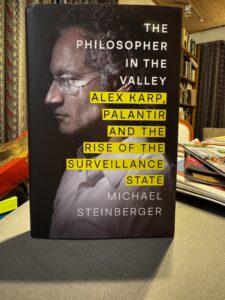Man Ray’s spectacles?

I’ve always been fascinated by Man Ray, the surrealist painter and photographer. Yesterday, I was struck by the shadows cast by this pair of spectacles in strong sunlight, and thought of him. So I pressed the button, and here it is.
Quote of the Day
”The many uses of analogy are balanced by the mischief which arises from its misuse.”
- David Hackett Fischer (in Historians’ Fallacies, 1970)
Musical alternative to the morning’s radio news
The Weight | Featuring Ringo Starr and Robbie Robertson | Playing For Change | Song Around The World
This was one of the good things to come from the pandemic. Fabulous singing, coordination and editing. And moving.
Long Read of the Day
The long history of unaccountable elites in American life
The Epstein files now being gradually published by the US House of Representatives are providing a lever for prying open several cans of worms. One is the nature and prevalence of a group of wealthy and powerful males who believe that the laws and moral codes that bind lesser mortals don’t apply to them.
Heather Cox Richardson (Whom God Preserve) is an American historian who’s terrific at putting current events in their historical context. Her substack blog is a must-read, and the edition of November 16 shows why. In it she points out that belief in a hidden American faux-aristocracy goes back a long way.
In 1858, in a period in which a few fabulously wealthy elite enslavers in the American South were trying to take over the government and create their own oligarchy, South Carolina senator James Henry Hammond explained to his colleagues that “democracy” meant only that voters got to choose which set of leaders ruled them. Society worked best, he said, when it was run by natural leaders: the wealthy, educated, well-connected men who made up the South’s planter class.
Hammond explained that society was naturally made up of a great mass of workers, rather dull people, but happy and loyal, whom he called “mudsills” after the timbers driven into the ground to support elegant homes above. These mudsills supported “that other class which leads progress, civilization, and refinement,” one that modeled itself on the British aristocracy. The mudsills needed the guidance of their betters to produce goods that would create capital, Hammond said. That capital would be wasted if it stayed among the mudsills; it needed to move upward, where better men would use it to move society forward.
Hammond’s ideology gave us the 1857 Dred Scott v. Sandford decision, in which the Supreme Court found that Black Americans “are not included, and were not intended to be included, under the word ‘citizens’ in the Constitution, and can therefore claim none of the rights and privileges which that instrument provides for and secures to citizens of the United States.”
You get the idea. Do read it, and savour the Abraham Lincoln quote that comes further down.
Thanks to Kevin Cryan for pointing me to it.
After I’d read the essay I dug out my battered copy of C. Wright Mills ’s 1956 book, which provides a good picture of the dominant elites in American society in the early post-war period. Interesting to see how things have evolved.
Amid a mental health crisis, could building AI therapists be a good idea?**
My latest Observer column…
A recent Wired headline read: “OpenAI says hundreds of thousands of ChatGPT users may show signs of manic or psychotic crisis every week.”
At first sight, the headline sounded like tabloid hyperbole. After all, according to OpenAI’s figures, only 0.07% of active ChatGPT users show “possible signs of mental health emergencies related to psychosis or mania”, while only 0.15% “have conversations that include explicit indicators of potential suicidal planning or intent”. And then the scale registers: with 800 million weekly users, even 0.07% represents hundreds of thousands of people in crisis.
What prompted this disclosure? OpenAI had obviously been monitoring interactions between users and its bot, collecting data on warning signs such as extended chat sessions and perhaps also learning from the uproar after its abrupt (and temporary) withdrawal of GPT-4o, a model valued by users for the level of intimacy they felt it enabled…
Books, etc.

This arrived yesterday. Karp is, to put it mildly, a strange guy — a philosopher (not a geek) running a tech company (Palantir) which has become very controversial. He’s the only philosopher I know of who has a 24-hour security detail and is followed everywhere by a black SUV containing chaps who are, er, muscular. If anyone out there is thinking of a remake of Stanley Kubrick’s Dr Strangelove, Karp might be worth studying. In the meantime, this biography is now on my bedside table.
This Blog is also available as an email three days a week. If you think that might suit you better, why not subscribe? One email on Mondays, Wednesdays and Fridays delivered to your inbox at 5am UK time. It’s free, and you can always unsubscribe if you conclude your inbox is full enough already!
